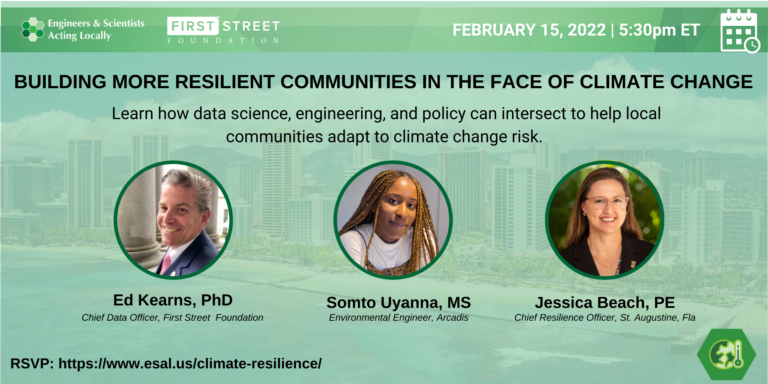
On February 15, ESAL hosted its first event of 2022, “Building More Resilient Communities in the Face of Climate Change.” While the climate problem is global in scale, often the solutions of adaptation and mitigation come down to local implementation. This virtual panel featured three representatives from nonprofits and local agencies: including Ed Kearns, chief data officer at First Street Foundation; Somto Uyanna, an environmental engineer in New York City; and Jessica Beach, chief resilience officer for St. Augustine, Florida.
Water—in the form of stormwater, heavy precipitation, and rising sea levels—emerged as the central theme of the discussion. As climate change progresses, coastal cities, which include both large metropolitan regions like New York City as well as smaller communities like St. Augustine, will become increasingly susceptible to flooding.
First Street Foundation is a climate data nonprofit, where Kearns leads the push to translate climate risk to individuals. The goal is to help people understand how their lives might be impacted by changing weather patterns. First Street has a powerful web app called Flood Factor that provides flood risk information for every property in the U.S. Flood Factor’s integration into real estate sites also allows future homeowners to understand potential risk. Kearns takes pride in their work being “hyper local and highly personal,” a fine-grain focus that neither public or private organizations offer. First Street is now building new tools to determine local wildfire, heat, and drought risk.
In New York City, Uyanna’s career as an environmental engineer has focused on sustainability and climate resilience. At this virtual event, she presented an overview of resilient water infrastructure in NYC and touched on the destruction caused by Hurricane Sandy in 2012 and Hurricane Ida in 2021. A key problem in NYC lies with its outdated sewer system built in the 19th century. The system carries both sewage and stormwater and overflows when there is excessive, concentrated rainfall. These events are only expected to increase. The problem is exacerbated by NYC’s high population density and the nature of its concrete jungle, giving large swaths of impervious surface that prevent water from being absorbed.
While much smaller in size, St. Augustine, FL (population 15,000) faces many of the same challenges as NYC. According to Beach, St. Augustine is low-lying and coastal with aging infrastructure and significant areas of impervious paved surfaces. St. Augustine is a tourist destination that sees six million visitors each year and, therefore, adapting to climate change is paramount. Although flooding is not new to this town, the frequency of “sunny day” flooding has been increasing. With state and federal funding, they continue to upgrade their water infrastructure with the installation of tide check (one way) valves, pumps, flood walls, and kevlar panels in critical areas.
Throughout this virtual discussion, recurring questions arose around equity in climate change: how to best prioritize adaptation and mitigation needs; where to direct limited resources; and how to determine who is most affected, especially communities of color and low-income neighborhoods. While there are no easy answers, all three panelists spoke to the importance of factoring in socioeconomic needs when conducting assessments. Local agencies cannot rely solely on hard engineering and technical analyses. Achieving equity requires holistic evaluations to elevate the most vulnerable residents.
A recording of the event is available on ESAL’s YouTube channel.